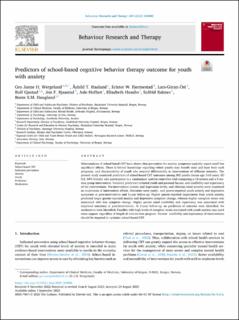| dc.contributor.author | Wergeland, Gro Janne Henningsen | |
| dc.contributor.author | Håland, Åshild Tellefsen | |
| dc.contributor.author | Fjermestad, Krister Westlye | |
| dc.contributor.author | Öst, Lars Gøran | |
| dc.contributor.author | Gjestad, Rolf | |
| dc.contributor.author | Bjaastad, Jon F | |
| dc.contributor.author | Hoffart, Asle | |
| dc.contributor.author | Husabo, Elisabeth | |
| dc.contributor.author | Raknes, Solfrid | |
| dc.contributor.author | Haugland, Bente Storm Mowatt | |
| dc.date.accessioned | 2023-12-28T12:14:03Z | |
| dc.date.available | 2023-12-28T12:14:03Z | |
| dc.date.created | 2023-09-22T12:45:35Z | |
| dc.date.issued | 2023 | |
| dc.identifier.issn | 0005-7967 | |
| dc.identifier.uri | https://hdl.handle.net/11250/3109020 | |
| dc.description.abstract | Meta-analyses of school-based CBT have shown that prevention for anxiety symptoms typically report small but significant effects. There is limited knowledge regarding which youths may benefit most and least from such programs, and characteristics of youth who respond differentially to interventions of different intensity. The present study examined predictors of school-based CBT outcomes among 302 youths (mean age 14.0 years, SD 0.8, 84% female) who participated in a randomized waitlist-controlled trial comparing a 10-session and a 5-session group intervention. Potential predictors included youth and parental factors, and credibility and expectancy of the interventions. Pre-intervention anxiety and depression levels, and clinician rated severity were examined as moderators of intervention effects. Outcomes were youth-, and parent-reported youth anxiety and depressive symptoms at post-intervention and 1-year follow-up. Higher parent-reported impairment from youth anxiety predicted larger parent-reported anxiety and depressive symptom change, whereas higher caregiver strain was associated with less symptom change. Higher parent rated credibility and expectancy was associated with improved outcomes at post-intervention. At 1-year follow-up, no predictors of outcome were identified. No moderators were identified. Families with high levels of caregiver strain associated with youth anxiety may need extra support regardless of length of intervention program. Parents’ credibility and expectancy of interventions should be targeted to optimize school-based CBT. | en_US |
| dc.language.iso | eng | en_US |
| dc.publisher | Elsevier | en_US |
| dc.rights | Navngivelse 4.0 Internasjonal | * |
| dc.rights.uri | http://creativecommons.org/licenses/by/4.0/deed.no | * |
| dc.title | Predictors of school-based cognitive behavior therapy outcome for youth with anxiety | en_US |
| dc.type | Journal article | en_US |
| dc.type | Peer reviewed | en_US |
| dc.description.version | publishedVersion | en_US |
| dc.rights.holder | Copyright 2023 The Author(s) | en_US |
| dc.source.articlenumber | 104400 | en_US |
| cristin.ispublished | true | |
| cristin.fulltext | original | |
| cristin.qualitycode | 2 | |
| dc.identifier.doi | 10.1016/j.brat.2023.104400 | |
| dc.identifier.cristin | 2177920 | |
| dc.source.journal | Behaviour Research and Therapy | en_US |
| dc.identifier.citation | Behaviour Research and Therapy. 2023, 169, 104400. | en_US |
| dc.source.volume | 169 | en_US |

